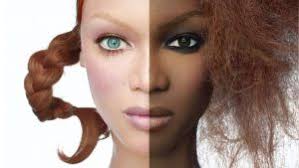Senate Directive: Dermatologist Warns Against Skin Bleaching
Featured, Latest Headlines, News, News Across Nigeria, News From The State Sunday, March 7th, 2021
(AFRICAN EXAMINER) – Dr Olarewanju Falodun, the Chief Consultant Dermatologist, National Hospital, Abuja (NHA), has cautioned Nigerians against skin bleaching, saying it may result to health disorders associated with cancer, diabetes and other complications.
Falodun gave the warning in an interview in Abuja on Sunday, noting that the composition of some skin-lightening products may have dire consequences on the entire body.
It recalls that the Senate, on Feb. 18, directed the National Agency for Food and Drug Administration and Control (NAFDAC) to regulate the importation, formulation and sale of cosmetics within Nigeria, especially skin bleaching products.
Skin bleaching refers to the use of products to lighten dark areas of the skin or achieve an overall lighter complexion through the use of creams, soaps and pills, as well as professional treatments like chemical peels and laser therapy.
Some people apply skin lightener to their entire body to change their complexion, which experts say can be very risky, as the active ingredient in some skin lighteners is mercury, a toxic agent that can cause serious psychiatric, neurological and kidney problems.
According to the consultant dermatologist, some of the body cream products also contain chemicals such as hydroquinone, steroids, cojic acids and others, and their use for a long time may be hazardous to the skin.
Falodun explained that continuous use of creams with such contents would make the topmost layer of the skin to thin out, wrinkle, irritable and may lead to poor healing of wounds.
While emphasising that skin bleaching has no health benefit, the expert said “some of these bleaching agents on their own can actually lead to other problems. Some of them contain mercury and that can lead to kidney problem, kidney failure and nephrotic syndrome.
“If you use steroid also for a long period, that can affect the blood stream and can affect the blood sugar, and can actually cause diabetes.”
The expert, however, urged the public to seek dermatologists’ attention when facing skin problem for professional medical advice.
He said “for me, I believe that if anybody has acne or any skin problem that is disturbing enough, the person should see a dermatologist, who will advise on the best medication for treatment.”
He, therefore, commended the Senate directive to NAFDAC to regulate the importation, formulation, and sale of cosmetics, especially bleaching cream within Nigeria due to its harmful effects on users.
He advised that people should remain as natural as possible, eat and rest well, and consume lots of water to maintain a healthy and glowing skin.
An Abuja-based general practitioner also advised Nigerians against abuse of bleaching creams, saying the act could cause skin cancer, skin damage and other health complications.
The practitioner, who spoke on condition of anonymity, told NAN that any bleaching cream used in high amount, more than five per cent could damage the skin, adding that it was good to keep the skin the way God created it than bleaching it.
The expert listed bleaching products to include hydroquinone, steroid cream (Clobetasol propionate) and mercury.
She explained that “hydroquinone is used for the treatment of skin conditions but when cleared, it is advisable to stop just like you take malaria medication and after a prescribed dose, you stop.
“The issue here is the quantity. If the formulation is small, it will not have effect but if it is high concentration, it can cause skin irritation and kidney damage.”
Similarly, she said, steroid cream (clobetasol propanote), which had strong lightening effect on the skin, could also damage the skin when abused.
“It is also used to treat many skin diseases such as psoariasis and contact dermatitis but after treatment, one should stop because of the adverse effect on the body.
“It can cause stretch mark, green veins and bumps on the face. It can also cause the person to add weight and later lead to hypertension,’’ she said.
According to her, mercury, another bleaching product, has been banned in the market, adding that it can cause kidney damage too.
Meanwhile, a cross section of Abuja residents who separately spoke , said bleaching the skin was alien to the Africa culture, noting that while people bleach to alter their skin colour, they should also think about the side effects.
Cherish Adewale, a corps member, said people bleach to impress others, especially the opposite sex, that is to make others feel they look good.
“It is not good to bleach because of its adverse effects on the skin like irritation, multiple colour skin and bad odour in some cases,’’ she said.
According to her, it will be good for government to ban bleaching creams so that people will not have any option than to appreciate their skin colour.
Similarly, Christine Eke, a student of University of Abuja, said people use bleaching cream because they were not proud of their skin.
“I support the move by the Senate on bleaching creams because it will make us tolerate our culture amidst ourselves and be proud of it.’’
For Christopher Uche, a Public Servant, some people bleach their skin because they are ignorant of its health implications.
However, a cosmetic seller in Abuja who would not want to be identified, said “bleaching is a choice and people should be allowed to decide if they want to tone, bleach or maintain their skin colour.”
He added that the demand for bleaching cream was increasing, “so, whatever people want, we give to them; we are in business, afterall, it is a matter of choice.”
Meanwhile, others described the Senate directive as an infringement on the fundamental rights of the citizenry.
Some said government could ban the importation of bleaching products, but it would be difficult to monitor the use, “as it may not be possible to go about arresting people presumed to be bleaching.”
A resident of Lugbe in Abuja, Mrs Mary Agbo, who commended the move, however, said “some people cannot live without bleaching creams.”
She stressed the need for government and experts to sensitise the public about the negative effects of bleaching, saying most people do it because they were not aware of its implications.
Ada Eze, a resident of Kubwa in the Federal Capital Territory, said although bleaching of the skin was a thing of choice, Nigerians should always be proud of their colour.
Eze said “it is okay if government regulates bleaching cream importation, but it should not be imposed because people bleach for many reasons.
“I don’t know why, but I have seen the case of some parents using bleaching creams on their children.”
Mrs Mary Olufemi, a businesswoman in Mpape, a suburb of Abuja, said there was need for government to carry out massive enlightenment campaign on bleaching to discourage many.
She also called for tariff hike on importation and sale of such products to discourage the act.
Olufemi said “another thing is that some men love women that are fair, hence the reason why some women bleach.
“Some women also see it as yardstick for competition to entice the menfolk, others do it out of ignorance believing it is normal, while other women just want to be as fair as others, not minding the consequences and not thinking that others are naturally fair.
“The case is same for some men too. Both men and women engage in the unhealthy act for reasons best known to them.”
She, however, added that “for me, I see men who bleach their skin as womanisers; there is no reason why a man should bleach his skin if he has no hidden agenda.” (NAN)
Related Posts
Short URL: https://www.africanexaminer.com/?p=60458






















